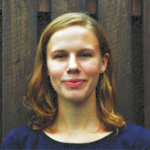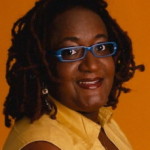
Consumption: Food as Paradox
Consumption: Food as Paradox examines how food is inextricably linked to the social, political and economic aspects of life—class, culture, race, religion, gender and health. A baker’s dozen of contemporary artists, working in paint, collage, porcelain and printmaking, explore food and its connection to the world around them.
Panel Discussion: Are You Gunna Eat That?
Sunday, March 20, 2016
2:00pm – 4:00pm
Tea served with savory treats starting at 2:00pm
Panel Discussion begins at 2:45pm
Cost: $20 per person
Panelists

Laura Flamm is the Baltimarket and Food Access Director at the Baltimore City Health Department (BCHD). In that role, she heads BCHD’s place-based food access strategies, which include the Virtual Supermarket grocery delivery program, the Healthy Stores small retailer and youth program, and the Neighborhood Food Advocates leadership development initiative. She has a MSPH from the Johns Hopkins Bloomberg School of Public Health. Laura believes that food can be a tool for personal and community transformation.

Emma Reisinger is an urban farmer in Baltimore City at Hidden Harvest Farm. She has also gained experience with urban growing at Boone Street Farm, Whitelock Community Farm, and the Baltimore Free Farm through an Americorps position with the Farm Alliance of Baltimore City. In addition to farming, she currently works in the restaurant industry. Her perspective on food comes from growing, eating, or serving food during most of her waking hours. A Baltimore native, she has an undergraduate degree in English and studio art from St. Mary’s College in Southern Maryland, and studied in the postgraduate Environmental Policy program at University College Dublin in Dublin, Ireland.

Psyche Williams-Forson is an Associate Professor in the American Studies department at the University of Maryland and served as Director of Graduate Studies from 2009 to summer of 2012 in the Department. She is an affiliate faculty member of the Women’s Studies and African American Studies departments and the Consortium on Race, Gender, and Ethnicity. Her research and teaching interests include cultural studies, material culture, food, women’s studies, social and cultural history of the U.S. in the late 19th and 20th centuries.

Marie Spiker, Registered Dietitian, doctoral student in Human Nutrition at the Johns Hopkins Bloomberg School of Public Health, fellow at the Johns Hopkins Center for a Livable Future.